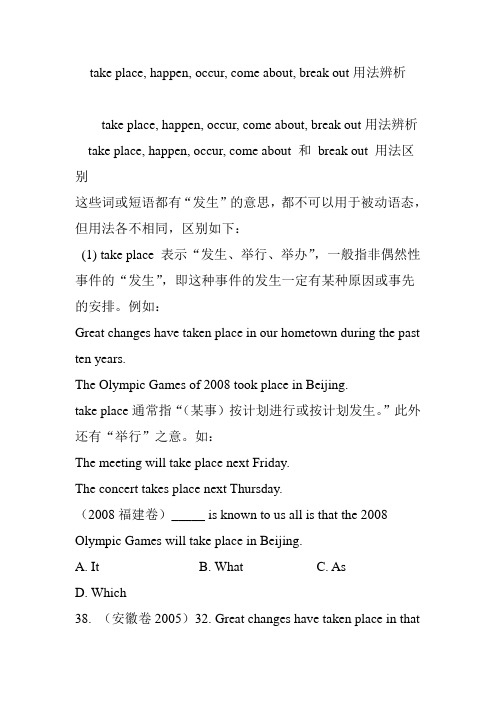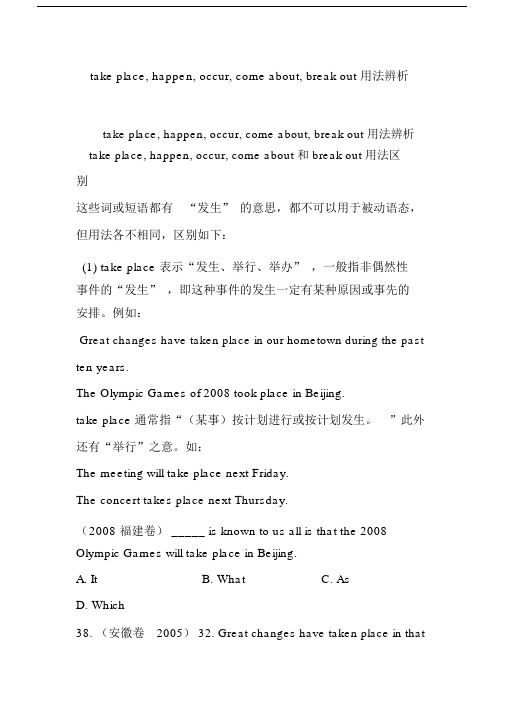Take place 和happen的用法
2019外研版高中英语选择性必修二Unit6 易混易错点辨析

Unit6 易混易错点辨析●happen; occur; take place【教材原句】The crime took place in a seaside suburb of Cape Town. (教材P62)【辨析】三者都有“发生”的意思,都是不及物动词,都没有被动语态,但是有一定区别。
take place一般表示有准备或按计划安排要发生的事情,也可以表示“举行,举办”会议,运动会等happen 和occur一样可以表示事情意外或偶然地发生,这种情况下两者常可换用;happen 常构成以下结构:① sth. happen to sb./sth. 某人发生某事/某物怎么了② sb. happen to do sth. 某人碰巧做某事③ it happened + that 从句碰巧……④there happen to be …… 碰巧有…..occur除了表示意外或偶然发生某事外,也表示“想起,突然想起”,常构成以下结构:① sth. occur to sb. 某人想起(突然想起)某事② it occur to sb. to do sth. 某人想起(突然想起)做某事③ it occur to sb. + that 从句某人想起(突然想起)某事【例句呈现】What happened to your truck?你的卡车怎么样了?There happened to be some people there then.那时,碰巧有一些人在那里。
It never occurred to her to ask anyone.她从未想到去问问别人。
It never occurred to me that he might be in trouble.我怎么也没有想到他会遇上麻烦。
Didn't it occur to you that he was lying?你当时没想到他在撒谎吗?How did the accident happen/occur?事故是怎样发生的?That plane crash occurred/happened only minutes after take-off.空难在起飞几分钟后就发生了。
happen 的用法

Happen 的三种用法与三点注意一、happen是不及物动词。
happen在初中英语教材中的用法主要有以下三种:1. "sth.+happen+地点/时间",意为"某地/某时发生了某事"。
例如:An accident happened in that street.那条街发生了一起事故。
What's happening outside?外面发生什么事了?2. "sth.+happen to+sb."意为"某人出了某事(常指不好的事发生在某人身上)"。
例如:A car accident happened to him yesterday.昨天他发生了交通事故。
What happened to you?(=What was wrong / the matter with you?)你怎么啦?3. "sb.+happen+to do sth."意为"某人碰巧做某事"。
例如:I happened to meet her in the street.我碰巧在街上遇见她。
It happened that I was out when he called.他来访时我碰巧不在。
二、同学们在使用happen时,以下三点情况值得注意:1. happen为不及物动词,不能用于被动语态。
例如,要表示"这个故事发生在去年。
"不能说:The story was happened last year.但可以说:The story happened last year.2. happen为短暂性动词,不能与表示一段时间的状语连用。
例如,要表示"这事发生一年了。
"不能说:This happened for one year.但可以说:This happened one year ago.3. happen一般用来强调某事发生的偶然性。
英语单词happen的各种用法

英语单词happen的各种用法英语单词happen的各种有用用法,快来一起学习吧。
下面我就和大家共享,来观赏一下吧。
英语单词happen的各种有用用法something that occurs 发生ex. What happened?发生什么事?= What occurred?但这用于每天会发生的对话中会太正式,因此用happen会比较好。
ex. It all happened so fast, I tripped on the sidewalk.一切发生得太快了,我在人行道上绊倒。
ex. I don’t remember exactly what happened!我真的不记得发生什事!day or time 发生于某天或某时ex.Max : when did you get engaged?你什么时候订婚?Una : It happened on Saturday.礼拜六。
ex. Don’t worry, it happens all the time.别担忧,这随时都在发生。
对实际发生产生疑问.质疑时的状况ex. I can’t believe this is really happening! 我不敢信任它真的发生了!ex. Oh no, this can’t be happening!哦不,这不行能发生的!发生在未知的状况ex. You’ll never guess what happened!你绝不会猜到发生什么事!ex. We’ll just see what happens.我们就来看看会发生什么。
ex. I don’t know what happened.我不知道发什么事。
碰巧发生.巧合的状况ex. Woah! I happened to buy the same beer!哇呜!我碰巧买了同样的酒!happen to + infinitive 发生在+不定词ex. If you happen to see Vanessa, tell her I said, “ Hi. ”假如你碰巧看到Vanessa,帮我跟他说声“嗨”。
中考英语意思相近用法却不同的近义词汇总

some times是“几次、几倍”之意。 如:They have been there several times。 how long, how often, how far, how soon how long意为“多久、多长时间”,主要是对一段时间进行提问,答语通常是(for)three days/weeks/months等时间段, 它可用于各种时态。
How long do you stay in Beijing every year?
每年你在北京住多久?
how often意为“多久……次、是否经常”,用来提问在某一特定的时间进行某个动作的次数,答语通常是 always,usually,often,sometimes,once/twice a day/month等。 How often do you get to school very early?
It cost us five dollars。 (5)It takes/took sb。 … to do sth。 花了某人…(时间、金钱)做某事。 It takes us ten minutes to brush my teeth every day。 too much, too many, much too too much + 不可数名词 too many + 可数名词 much too + 形容词、副词 (1)There is too much milk in the basket。 (2) She ate too many biscuits yesterday morning。 (3) He runs much too quickly。 (4) The chair is much too expensive。 after , in (1)After+时间段 表达过去一段时间以后,常用于过去时态的句子; I received the letter after two days 。 我是两天以后收到这封信的。 (2)After+时间点 表示将来一段时间以后,用于将来时态的句子。 He will arrive after four o‘clock 。 (3)in+时间段 以现在为起点,表示将来一段时间以后,常用于将来时态的句子。 You will receive the letter in three days 。
辨析happen,take place-配套练习

辨析happen,take place-配套练习1. ---Do you know when the sports meeting _______ this year?---In November.A. will take placeB. will holdC. is going to be taken placeD. will happen解析:选A. 句意为:---你知道今年的运动会什么时候召开吗?---在十一月份。
happen表示偶然的没有预料到的事情的发生,而take place表示必然发生或经过布置、策划后进行的事情。
所以选A。
2. A bad accident ______ to that family.A. happenB. happenedC. took placeD. take place解析:选B. 句意为:一次糟糕的意外发生了那个家庭。
happen表示偶然的没有预料到的事情的发生,而take place表示必然发生或经过布置、策划后进行的事情。
另外,根据句意,事故已经发生了,应该用一般过去时,所以选B。
3. The final exam ______ next Thursday.A. will take placeB. take placeC. will happenD. happen解析:选A. 句意为:期末考试将会在下周四进行。
happen表示偶然的没有预料到的事情的发生,而take place表示必然发生或经过布置、策划后进行的事情。
另外,根据句意,本题要用一般将来时,所以选A。
4. Take care! Accidents will ______ along this part of the road.A. take placeB. be take placeC. happenD. be happened解析:选C. 句意为:当心,这条路的这个部分会发生意外。
happen表示偶然的没有预料到的事情的发生,而take place表示必然发生或经过布置、策划后进行的事情。
take place, happen, occur, come about, break out用法辨析

take place, happen, occur, come about, break out用法辨析take place, happen, occur, come about, break out用法辨析take place, happen, occur, come about 和break out 用法区别这些词或短语都有“发生”的意思,都不可以用于被动语态,但用法各不相同,区别如下:(1) take place 表示“发生、举行、举办”,一般指非偶然性事件的“发生”,即这种事件的发生一定有某种原因或事先的安排。
例如:Great changes have taken place in our hometown during the past ten years.The Olympic Games of 2008 took place in Beijing.take place通常指“(某事)按计划进行或按计划发生。
”此外还有“举行”之意。
如:The meeting will take place next Friday.The concert takes place next Thursday.(2008福建卷)_____ is known to us all is that the 2008 Olympic Games will take place in Beijing.A. ItB. WhatC. AsD. Which38. (安徽卷2005)32. Great changes have taken place in thatschool. It is no longer ______ it was 20 years ago, _____ it was so poorly equipped./A. what; when B. that; which C. what; which D. which; that (名词)(2) happen 作“发生、碰巧”解,常指具体事件的发生,特别指那些偶然的或未能预见的“发生”,一般用于偶然或突发性事件。
take place, happen, occur, come about和break out用法区别

take place, happen, occur, come about和break out用法区别这些词或短语都有“发生”的意思,但用法各不相同,区别如下:(1). take place 表示“发生、举行、举办”,一般指非偶然性事件的“发生”,即这种事件的发生一定有某种原因或事先的安排,例如:Great changes have taken place in our hometown during the past ten years.The Olympic Games of 2008 will take place in Beijing.(2) .happen作“发生、碰巧”解,一般用于偶然或突发性事件,例如:What happened to you? (一般不说:What did you happen?)Maybe something unexpected happened.I happened to see him on my way home.= It happened that I saw him on my way home.(3). occur作“发生、想到、突然想起”解,其意义相当于happen,例如:What has occurred? (=What has happened?)A big earthquake occurred (=happened) in the south of China last month.It occurred to me that she didn’t know I had moved into the new house.(4). come about表示“发生、产生”,多指事情已经发生了,但还不知道为什么,常用于疑问句和否定句,例如:When Mother woke up, she didn’t know what had come about.I’ll never understand how it came about that you were late three times a week.Do you know how the air accident came about?(5). break out意思为“发生、爆发”,常指战争、灾难、疾病或者争吵等事件的发生,也可以表示突然大声叫喊等,例如:Two world wars broke out last century.A fire broke out in the hospital in the mid-night.After the flood, diseases broke out here and there.She broke out, “That is too unfair!”occur vi. 1发生2 想起,想到常用搭配:sth. occurs to sb.:某人突然想起某事;It never occurred to sb. that…:某人从未想到……More people are afraid to take planes because several air crashes have occurred this month. Suddenly a good idea occurred to her.It never occurred to us that the well-dressed man was a pickpocket.我们决没有想到,那个衣冠楚楚的人是个扒手。
takeplace,happen,occur,comeabout,breakout用法辨析.doc

take place, happen, occur, come about, break out 用法辨析take place, happen, occur, come about, break out 用法辨析take place, happen, occur, come about 和 break out 用法区别这些词或短语都有“发生”的意思,都不可以用于被动语态,但用法各不相同,区别如下:(1)take place 表示“发生、举行、举办” ,一般指非偶然性事件的“发生” ,即这种事件的发生一定有某种原因或事先的安排。
例如:Great changes have taken place in our hometown during the past ten years.The Olympic Games of 2008 took place in Beijing.take place 通常指“(某事)按计划进行或按计划发生。
”此外还有“举行”之意。
如:The meeting will take place next Friday.The concert takes place next Thursday.(2008 福建卷) _____ is known to us all is that the 2008 Olympic Games will take place in Beijing.A. ItB. WhatC. AsD. Which38. (安徽卷2005) 32. Great changes have taken place in thatschool. It is no longer ______ it was 20 years ago, _____ it was so poorly equipped./A. what; when B. that; which C. what; which D. which; that(名词)(2)happen 作“发生、碰巧”解,常指具体事件的发生,特别指那些偶然的或未能预见的“发生” ,一般用于偶然或突发性事件。
